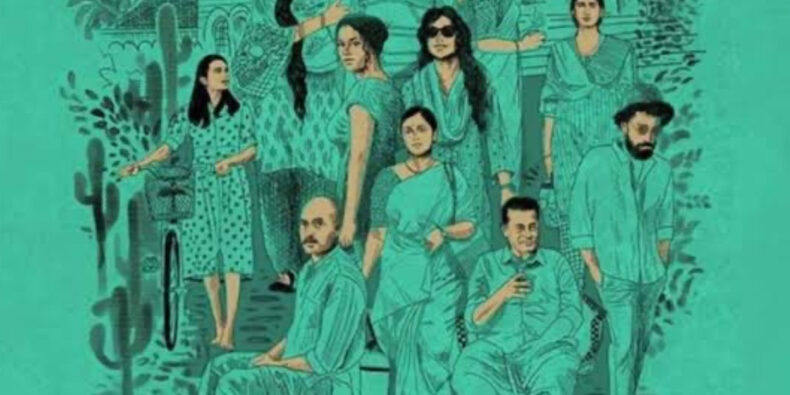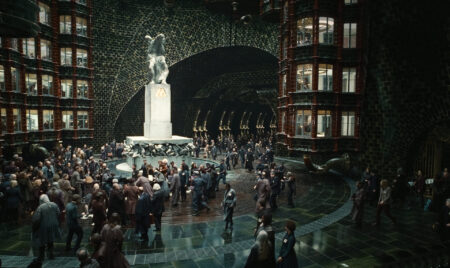An anthology like Modern Love: Chennai is rare. Each section of this anthology works wonders, with refreshing writing and editing at a time when romance stories are considered an outdated genre that no longer surprises viewers. Based on a collection of real-life essays published in The New York Times, Thiagarajan Kumararaja’s anthology features shorts that make you wonder what was real or fictional, and those that make you wish the events were true.

The weird thing about what happens in Rajumurugan’s Lalagunda Bommaigal is that first – you wonder if something similar really happened, you laugh a little and sometimes feel sorry for the characters, but you also know that it is as real as possible. Lalagunda begins as a love story between two souls, one reluctant to open up again and the other struggling to be accepted. Shoba (Sri Gouri Priya) lies broken on the hospital bed after an abortion, desperately closing off the world around her. Eventually, after many “fateful” events, she falls in love with Nathuram, a panipuri vendor. Unexpected events follow one another.
The biggest attraction is Sean Roldan’s music, which gives the whole thing a nonchalance. “Jingartathanga” in particular is brimming with energy to find love again. The text compares Shoba to a flying dove (although it looks peaceful but can defend itself) and Nathuram to a lonely shark (even when all alone in a dangerous ocean, it remains a shark). There are other surprisingly impressive aspects, like trying to shatter bigoted notions about migrants from northern India at a time when such incidents are in the headlines.

There is a compelling argument for the futility of fixed gender roles in Balaji Sakthivel’s Imaigal. Devi (TJ Bhanu) and Nithiyanandham (Ashok Selvan) are dating and she says that she’s going to lose her sight after a few years due to a degenerative eye disease, she seems to expect him to let her down. However, Nithiya marries her and promises to show her the whole world until she can. But after a few years, we find that Devi’s world has narrowed to housework and babysitting her daughter; Here it becomes clear how hopeless patriarchal gender roles are.
Another beautiful and skillful move is the foreground of this short, we see Devi looking us straight in the eye as if she could penetrate our souls; His motionless pupils seem so clear that it seems almost unnatural and is a foreshadowing of what we will recognize later. Interestingly, she looks at her more peacefully when she closes her eyes at a crucial moment at the end.
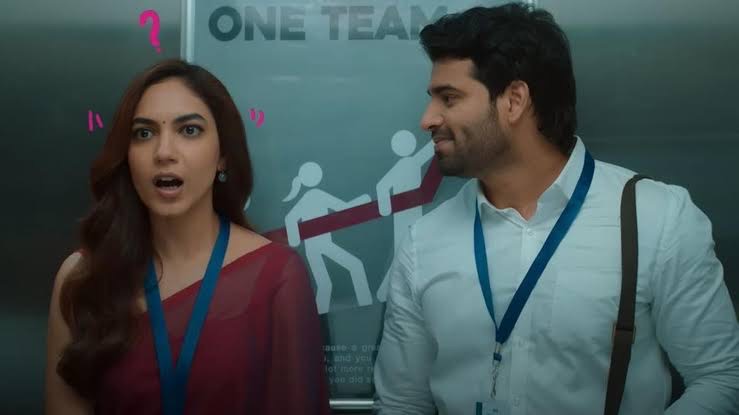
Cinema is the art of sharing a person’s imagination to everyone; This creates an unreal, albeit probable, world and allows mere mortals to live larger than life. Kaadhal Enbadhu Kannula Heart Irukkura Emoji by Krishnakumar Ramakumar is an ode to these romantics. Mallika (Ritu Varma) begins to wonder if anyone could ever become the dream ships that were Alaipayuthey’s Madhavan and Titanic’s DiCaprio. She is so persistent that even a national award-winning English ‘pesra’ film critic, “Blue Sattai”, cannot convince her.
Everything in this short film makes you swoon and reminds you of the charm, the joy and the anguish of an innocent love. There are throwbacks to Tamil films that create incredibly real and human moments while addressing the cinematic nature of it all. Even dealing with grief is filled with humor, and it’s nice to see a film that takes into account that food and movies are the most popular coping mechanisms. When Mallika wonders why there are no “soup songs” for women, you laugh but share your wonder. While there’s a good argument for making an effort to find people who share the same madness as you, it’s disappointing that even that casts a hypocritical lens on the beauty of unassuming moments in reality by using slow motion at a pivotal point.
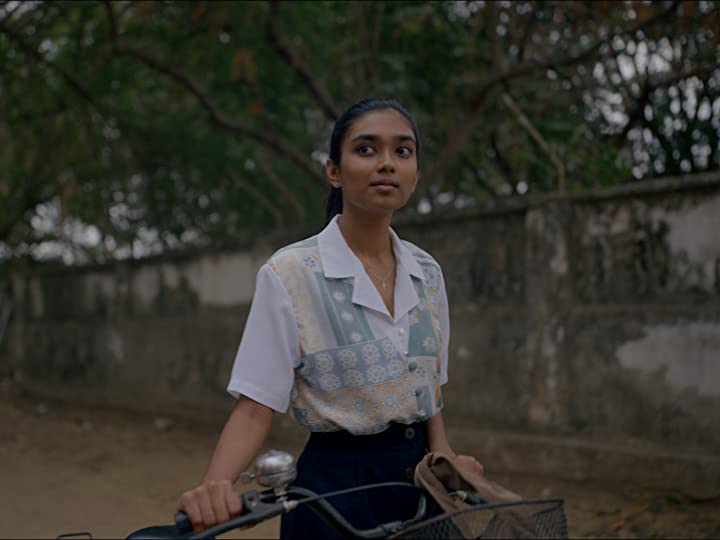
“Margazhi” by Akshay Sunder begins with a divorce and ends with the birth of love. He speaks of the feelings that bloom like flowers between the crevices of the rocks. Puberty, hormones and the desire to make up for the sudden absence of a mother storm the heart of young teenager Jazmine (Sanjula Sarathi), who lives with her divorced father (Srikrishna Dayal). Jazmine’s father enrolls her in a choir class at the local church, and there she meets Milton (Chu Khoy Sheng), a Delhi resident who is spending his winter vacation with his grandmother. Margazhi is about seasonal love – love that is temporary – and is meant to get you through the harsh winter. An ethereal world with minimal expression from its fantastic cast takes on overwhelming emotional power when Jazmine hears a particular Ilaiyaraaja song. Here, Ilaiyaraaja composes music for a world that celebrates his music. It is only when Jazmine plays a Ilaiyaraaja song on the piano and talks about her mother that we realize that it is the song that makes her fill the void in her heart.

In Bharathiraja’s short film Paravai Kootil Vaazhum Maangal, the metaphor of pruning a tree to give new life becomes a dialogue, a sign of overexposure, which becomes the sole subject of this short film. Ravi (Kishore), a married man, his wife Revathy (Remya Nambeesan) and Rohini (Vijayalakshmi), a woman Ravi is in love with, decide to discuss things to figure out how to make the best of the circumstances. Paravai Kootil.. is Bharathiraja’s ode to the late Balu Mahendra, a filmmaker known for his unconventional stories: “En Iniya Pon Nilaave” by Balu Mahendra’s Moodu Pani becomes the song where Ravi and Rohini fall in love and the similarities in the stories aside, it also pays homage to Marubadiyum (the latter’s characters are named after the actors).
Although the characters are part of a conventional family structure, the ideals they follow are modern; A typical example is Ravi’s explanation of how people can change, or Rohini’s comment about her inability to step back, even knowing what it means for Revathy. Rohini is not treated as “the other woman” but as an individual just trying to find happiness in her life.
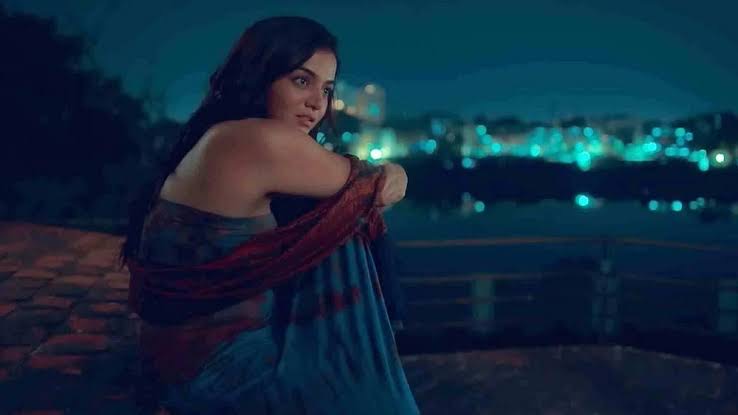
After Bharathiraja’s crystalline setting, Kumararaja’s world in Ninaivo Oru will take some time to get used to, especially given the scarlet and blue color theme. But a pause can help you see what the two colors mean. The splash of color indicates how two people in a relationship carry each other’s shards.
In this short , the last moments of the relationship are the most pleasant. K (PK) and Sam (Wamiqa Gabbi) make love for one last time and go their separate ways. Months later, we find out that Sam is heartbroken and K has suffered partial memory loss after a horrific accident. He only remembers Sam, and she is brought in to help him find his sanity.
Ninaivo Oru Paravai is definitely the first choice; The culmination of it all is the staging of the scene in which the two have explosive, mind-blowing sex that literally rocks each other’s worlds. Ilaiyaraaja’s background music reaches a crescendo in this scene and is the icing on the cake. Like another take on astrology from Kumararaja after Aaranya Kaandam, or how the characters challenge the innate anomaly of storytelling in the books and movies, there’s plenty that will captivate you. What’s most fascinating is how the characters embrace their world and make you question the reality of it all.
Chennai was needed to revive mature discussions on love. Most of the stories in the anthology manage to surprise you with their unique takes on romance, something that has been absent in new-age Tamil cinema, and umpteen moments end up lingering in your mind; it’s the best of storytellers coming together to tell a wonderful assortment of love stories.
Category: Entertainment, Review
Tags: Cinema, Chennai, Entertainment, Review







